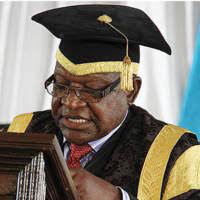Emotional send off for Prof. Bhebhe
By Dumisani Ndlovu
National hero and Midlands State University (MSU) founding Vice Chancellor, Professor Ngwabi Bhebhe, was yesterday given an emotional send-off during his burial.
A sombre atmosphere enveloped the National Heroes Acre in Harare on Saturday morning as the song Nzira yemasoja – traditionally played for fallen heroes – was played by the police band at the burial of Prof Ngwabi Mulunge Bhebe.
Several thousands turned out to bid farewell to a distinguished academic, mentor and committed nationalist who succumbed to diabetes on Friday last week, at Midlands Private Hospital.
He was 81.
The educationist and author of several books was declared a national hero by the government in recognition of his vast contribution to the development of tertiary education in the country, and to the struggle for independence.
Professor Bhebhe ’s son, Muzinayi said the late educationist was a loving father, husband and grandfather who instilled strong work ethics in the family.
“We are greatly honoured and very humbled at the same time with the government’s recognition of our father’s contribution to the nation, which has seen him fit to be buried among the illustrious sons and daughters of this great nation,” he said.
“He was principled and ensured that everyone did something tangible and beneficial to society. He encouraged hard work, honesty and dedication to tasks that one was carrying out,” he said.
Muzinayi said a humble background did not deter the late educationist and nationalist from his quest for education.
“You may not know but my father came from a very humble background where he could not even afford to pay for (school) fees. My father once told me that he was once asked why he was not paying fees and he answered ‘because all I need to go to school are my brains’. Such determination ensured that he took his education seriously,” he said.
Ambassador Christopher Mutsvangwa said the celebrated academic did not go with his wealth of knowledge as books he authored will be of benefit to many for generations to come.
“He left an indelible mark in the country’s education sector. He authored many books and several on history which will be of use to us and the future generation. He founded Midlands State University and that itself is a milestone for many who have been at the institution and those who will do studies there. Thousands of graduates are being churned out each year and that speaks volumes of the legacy he has left,” he said.
Among many of his scholarly, and administrative positions of authority at home and abroad, Prof Bhebe was a trustee of the Zimbabwe Mass Media Trust, chairperson of the Zimbabwe Council for Higher Education, council member of the Association of Commonwealth Universities, and Alternate Member of the Governing Board of the Association of African Universities.
In the arts, culture and recreation sector, Bhebhe was the board member of Hodzeko Arts and Culture’s newly established Zimbabwe International Disability Arts and Culture Festival (ZIDIAC Fest) which was set to be officially launched before end of this year.
He was also quite a number of boards, among them, a member of Ziscosteel (Pvt) Ltd Zimbabwe, and founding Executive Member of the Southern African Regional Universities Association.
It was no surprise that in honour of his contribution to the establishment and development of Midlands State University, it was indeed befitting that the institution early this week urged graduates of the tertiary institution to wear their academic regalia under the hastag – #Gown4ProfBhebe.
The late National Hero, Professor Bhebhe was born on 15 August 1942 in Mberengwa District, Midlands Province.
After completing secondary education at Chegato High School, the late Professor Bhebe became a temporary teacher in history.
In 1967, he graduated with a Bachelor of Arts degree in History and Geography from the then university of Botswana, Lesotho and Swaziland.
He became part of the pioneering cohort of black Zimbabwean historians to acquire Doctor of Philosophy Degrees. In 1972, he was awarded a PhD in Imperial History at the University of London.
The late Professor Bhebe’s area of research specialisation was informed by his commitment to unmasking the numerous misfortunes that had befallen the African people at the onset of foreign colonial rule.
Alongside other historians and intellectuals from various fields, the late Professor Bhebe became an intellectual resource to the Liberation Struggle. His efforts were deeply rooted in amplifying political awareness amongst the people.
In 1974, Professor Bhebhe lectured at Faurah Bay College in Sierra Leone, which was a key institution that supported the fight against colonial oppression. Later, he relocated to Southern Africa and joined the teaching staff at the University of Botswana-Lesotho and Swaziland in 1975.
He later rose to become Dean of Humanities at the Swaziland Campus.
After the attainment of Independence in 1980, Professor Bhebhe lectured at the University of Zimbabwe from 1982 to 1998. He remained committed to the nationalist cause as a nation-builder, academic and astute university administrator and higher education sector at large.
He was a highly acclaimed author with numerous books, journal articles and presentations on diverse themes. Among these were perspectives on traditional religion and Christianity; African biographies; the nexus between the land question and nationalist struggles; as well as conflict prevention and reconciliation.
He wrote an insightful biography on our late Vice President Muzenda, entitled, Simon Vengayi Muzenda and the Struggle and Liberation of Zimbabwe (2004) and another biography on the late national hero, Cde Benjamin Burombo.
Before that in 1985, he had published a portrait of the last Ndebele King, titled Lobengula. His numerous writings personified his commitment to enriching the body of knowledge on the liberation Struggle.
He is survived by his wife, Dr. Faith Bhebhe, five children, and nine grandchildren.
Kwedu Classics
Your story our story



